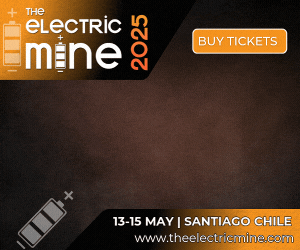
For the global lithium industry, currently grappling with excess supply across the battery supply chain, Chile, the world's second-largest producer, argues that the greater long-term risk lies in producing too little of the metal rather than too much.
The finance minister of the South American nation warned that in the coming years, the risk of a renewed shortage in lithium poses a more significant threat than oversupply. Such a shortage could lead to soaring prices and make alternative battery technologies more attractive.
“Production needs to increase so that it remains profitable and attractive to manufacture lithium batteries for electro-mobility,” Mario Marcel said in an interview Thursday from his office in Santiago.
Chile aims to prevent such a scenario. Recently, the government revealed a roster of salt flats slated for mining, aiming to double lithium output in the next decade through a novel public-private approach. If successful, this surge in supply would support the expanding EV industry's needs, particularly as the shift away from fossil fuels gains momentum. However, the lithium market remains volatile and relatively nascent. Prices soared in late 2022 as battery manufacturers increased stock amid rising EV sales, only to plummet last year as inventories were depleted.
Marcel mentioned that around two-thirds of the increased production from Chile would stem from SQM's planned collaboration with the state-owned Codelco, while the remaining third would come from new projects. This goal excludes potential expansions at Albemarle Corp.'s facilities.
President Gabriel Boric's strategy to tap more into the world's largest lithium reserves, aiming to reverse years of market share decline due to stringent output quotas, is structured in three main categories.
Two salt flats are deemed strategic, where the state will control future contracts. In two others, state-owned firms will have leeway to negotiate terms with private partners. Additionally, contracts for up to 26 other areas will be tendered out.
The government anticipates the development of three to four new projects by 2026, including the Codelco-led Maricunga project, one area currently managed by a state entity, and a couple of private ventures. Marcel noted that establishing another mine in the vast Salar de Atacama "would be challenging" due to water constraints.
When Boric initially presented his lithium strategy a year ago, industry apprehensions centered around his emphasis on increased state involvement and the necessity to adopt new, albeit scarcely utilized, methods promising greener and more efficient extraction processes worldwide.
This week’s announcement confirms that, at least in certain areas, companies have the opportunity to manage projects independently. Furthermore, new production techniques, collectively referred to as direct lithium extraction, will be viewed as a "desirable option" rather than a mandatory requirement in new contracts, as stated by Marcel.
“The perception was that this policy leaned heavily towards statism, perhaps due to political bias,” remarked the minister. “The crucial point now is that the situation has been unequivocally clarified.”




